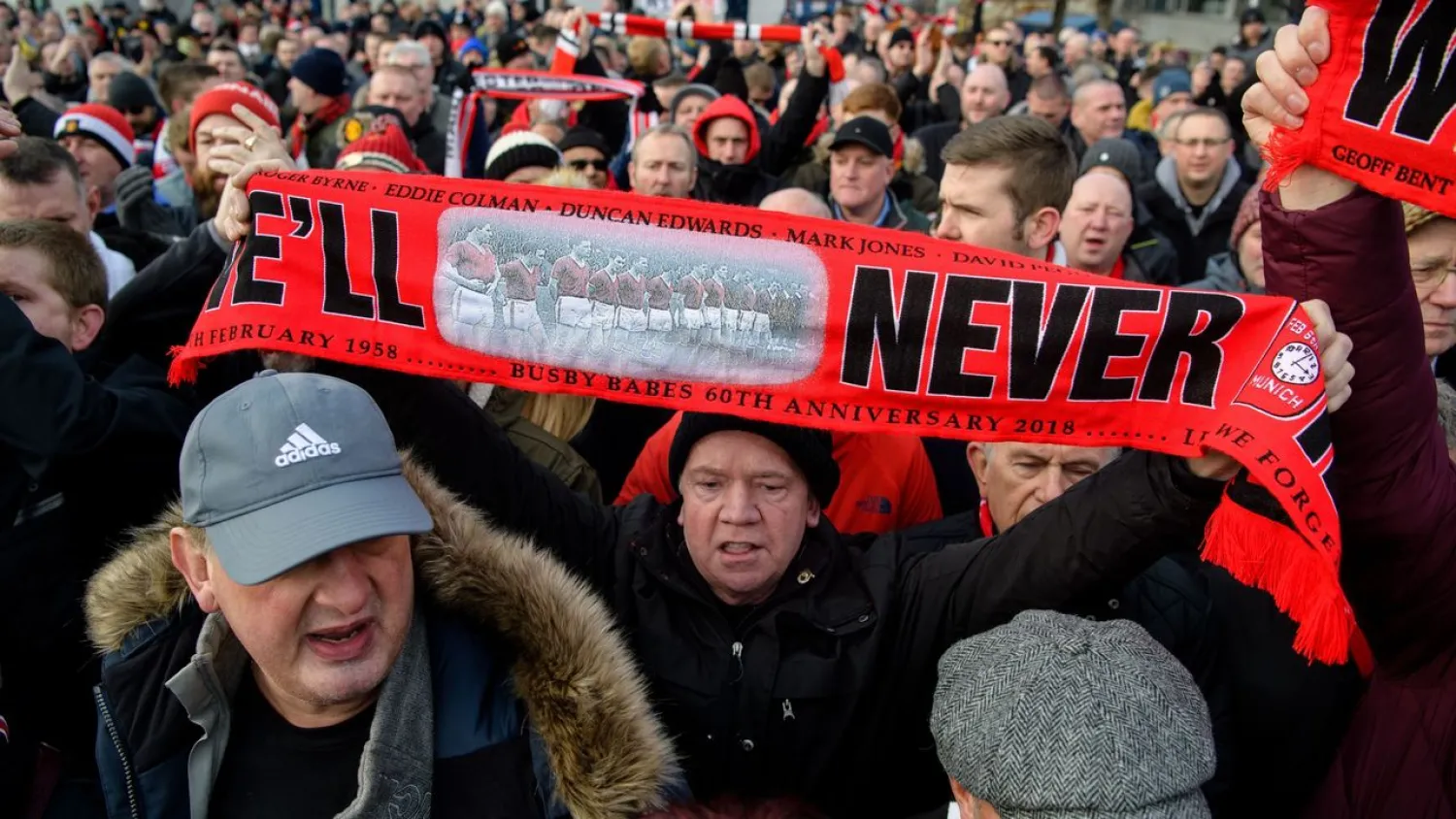Even now, on the 60th anniversary, recalling the Munich air disaster moves Geoffrey Fink to tears. “At the time, yeah, I cried,” says Fink, 85 years old and a Manchester United season-ticket holder since 1945. “I’ve got tears in my eyes now.”
Sitting in their Altrincham home over tea and cakes, he and his wife, Ruth, 80, who is also a United fan, vividly recall the moment they learned of the tragedy on the Munich-Riem runway on February 6, 1958.
Geoffrey, the club’s longest-standing season-ticket holder, who misses matches only because of inclement weather, was a shoe salesman. “I can remember it exactly – I used to work near Strangeways, the jail. We had a warehouse there,” he says. “And I’d walked into town at lunchtime for a sandwich and on the way back I went via Victoria station.
“There was somebody selling either the Manchester Evening News or Evening Chronicle and it just said: ‘United plane crash’. That was all. That night on the television reports started to come through that people had died and others were badly injured. Even Manchester City supporters were sorry.”
Ruth says: “I was at my sister’s and it went viral. Absolutely it was a national event. I can remember listening to the radio and there were these hourly bulletins about the players’ condition.”
Twenty-three people perished as a result of Flight 609’s crash. Eight were United players: full-back Geoff Bent, 25; left-back and captain, Roger Byrne, 28; wing-half Eddie Colman, 21; left-half Duncan Edwards, 21; center-half Mark Jones, 24; outside-left David Pegg, 22; center-forward Tommy Taylor, 26; and the 22-year-old inside-forward or wing Liam Whelan.
“I was pregnant at the time and the Monday after we went down to Princess Parkway to watch the coffins coming back in hearses,” says Ruth. “There were thousands watching in absolutely hushed silence.”
Three United staff, two crew, two passengers and eight newspaper football correspondents lost their lives, including the Manchester Guardian’s Donny Davies. The Daily Express’s Henry Rose was a friend of the Finks, attending their wedding a few months before the tragedy.
Ruth produces a large black and white photograph of her, Geoffrey and Rose on that September day. “We were very friendly with Henry, so it was a personal loss,” she says. “It was difficult to accept it had happened. For Henry Rose’s funeral I have a picture in my mind of Great Ancoats Street being absolutely crammed for the procession.”
Geoffrey says: “He was very famous with the United crowd in particular because he said if Tommy Taylor scores a hat-trick he’d eat his hat.”
While Sir Matt Busby fought for his life in hospital, Jimmy Murphy took over as manager for United’s first post-Munich game, a 3-0 win over Sheffield Wednesday. “Other clubs were very kind,” says Geoffrey. “There was Ernie Taylor, an England international, and Blackpool gave him, then United signed Stan Crowther from Aston Villa. It was mostly reserves for the first match, a sell-out, the atmosphere was fantastic, the ground full and with a scratch team they won.
“Jimmy Murphy was the right man to lead. He didn’t go on the trip due to looking after Wales [as manager]. United had what you’d call half a team and they got to the FA Cup final somehow; that was amazing.
“I don’t think we had any doubt that we would be rebuilt – particularly when Busby came back. You just presumed – arrogance if you like – we’d become a better club again.”
Geoffrey shows his ticket from the 1958 Cup final, which was lost 2-0 to Bolton. He also still has a 1946 season ticket, his stub for England’s 1966 World Cup victory against West Germany at Wembley and United’s European Cup triumph over Benfica at the same venue two years later.
“I don’t remember winning the First Division title the first time following it [1964-65] as anything,” says Geoffrey. “The European Cup was a tremendous atmosphere, United were one up until towards the end, then they equalized and missed a good chance but Eusébio couldn’t beat Alex Stepney.”
United won 4-1 after extra time, Bobby Charlton, George Best and Brian Kidd scoring. Charlton and Bill Foulkes were the only survivors of the crash in what was an XI molded from a second wave of Busby Babes. “That team wasn’t as good as the ’58 team,” says Geoffrey. “They [the ’58 team] were the best team in the country by far and many were young – one wondered how good they were going to get to be.”
He is, though, certain that Best is United’s greatest player, rather than Edwards, who was viewed as the finest to perish in the disaster. Geoffrey’s job allowed a meeting with the Northern Irishman, of whom he produces a photograph.
“Stylo Barratts were a big multiple shoe store and they got George Best to put his name on a football boot – it was on a lump of rubbishy plastic and didn’t ever sell,” he says. “Stylo Barratts gave us a free holiday to Paris and because of a promotional appearance regarding the football boot we met and this photograph was taken in a bar in Paris.”
“I can’t believe it’s 60 years – I remember aspects of it so vividly,” says Ruth. “I can still feel the emotion of it, like Geoffrey could, and he doesn’t cry easily.”
Geoffrey says: “It won’t affect me but talking about it before did.”
The Guardian Sport









